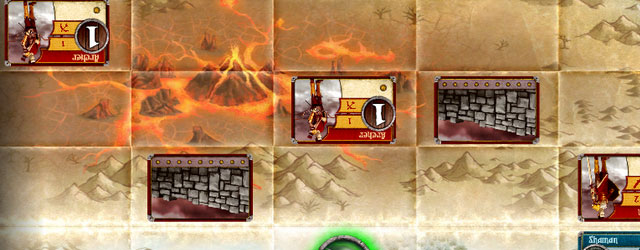[tab:Review]
Summoner Wars fills the most serious hole my iOS gaming had: it’s a superb game for asynchronous play. I fear I may be biased because of my abiding affection for earlier Playdek releases Ascension: Chronicle of the Godslayer and Nightfall, but I’ve never enjoyed turn-based multiplayer this much.
Playdek has implemented Plaid Hat Games’ existing card-based boardgame system with their usual facility at making the many relevant details easy to absorb. Each player starts with a constructible deck of fantasy-themed units and events and plays these onto a board which represents a skirmish-level battlefield. Each of the eight playable factions utilizes quite distinct paths toward taking out the opposing summoner and thereby winning the game, and careful deck construction offers further tuning of one’s strategy.
For example, I recently built a Jungle Elf deck specifically intended to use very few fragile units. Since kills are one of the ways to gain the mana needed to summon units, this plays a little bit like a land-destruction deck in Magic: the Gathering, in which neither player will tend to have many units on the field at a time, and the high quality of the mid-level units in the Jungle Elf faction will give me an advantage. That’s the theory, anyway–it’s partly a reaction to the tendency of the group of players I usually face to play the undead, who gain particularly impressive benefits from kills. Of course, another way to get mana is to discard cards, but if my opponent discards too fast, he’s likely to run out in the endgame and I’ll have an advantage in our war of attrition.
This illustrates the depth of the game. The variety of options it offers means Summoner Wars has some of the same sort of metagame analysis which goes on in Magic, but with each matchup tending to be less one-sided. Partly because combat is decided by die rolls, it’s more difficult to truly control the outcome purely during deck construction, which means tight tactical play still matters even in a disadvantageous match.
Since it’s rare for opponents to have any decisions to make on your turn, each turn offers you a fairly meaty piece of gameplay (unlike Nightfall, which is marvelous when played real-time but seems to drag when played asynch because one often gets only one relatively obvious decision before having to wait for an opponent). Summoner Wars also avoids my biggest problem with Ascension; while still a great asynch game, it really helps to remember what you’ve seen. Since I find this very difficult to do when turns are far apart, I feel like the nature of the game gets in my way; this is much less true of Summoner Wars.
What sets this game apart from Hero Academy is the excellent tutorial options which lead right into a great single-player experience. I was never very interested in getting into Hero Academy because I felt like I didn’t have much freedom to explore strategies in games that didn’t matter to me, because I was always playing with a real person. There’s enough going on in Summoner Wars that such exploration is really helpful and great fun–I’d find it absolutely a worthwhile purchase even if multiplayer were unavailable.
I do recommend thinking of it as an eight-dollar purchase. The game is free, but online play is locked until you make an in-app purchase, and you can only play one faction for free. You can buy the individual factions piecemeal for a buck each, plus their expansion cards for another buck, but it’s far more efficient to unlock all the game has to offer with the whole package and it’s easily worth the money.
Issues with the game include seemingly low-resolution card art and text on my iPad 2, both of which are lovely on the phone. I suspect some of the game elements are not offered at the resolution of the original iPad. I got over it pretty fast, but it was initially an off-putting contrast to the gorgeous battlefield backgrounds and interface elements. Prior to the recent bug-fixing update, I had a couple hard locks which required a reset, but none since. My prior experience with Playdek is that they’ve done a superb job of supporting their apps (both with bug fixes and with high-value in-app purchases), so the quick fix comes as no surprise. I’m not thrilled with the deck-building interface, but it’s adequate.
Deep, widely-varied strategy, deck-building and perfect online play are the highlights of this wonderful game. I’d love to ramble on about the pleasing mix of fantasy tropes and more innovative factions, colorful champions with interesting abilities (The Eater!), the complex balance between the virtues of units and the champions and summoner of their faction, mercenaries and other fascinating facets of the game, but this would delay you from starting your risk-free download. Proceed.
Review copy of game provided by publisher.
[tab:Screenshots]
[tab:END]


